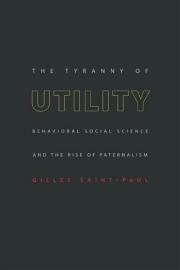 Arnaud Vaganay finds a courageous and original contribution to the field of behavioural economics in The Tyranny of Utility, but is not convinced by the author’s call for value-based policies in the context of the current debt crisis.
Arnaud Vaganay finds a courageous and original contribution to the field of behavioural economics in The Tyranny of Utility, but is not convinced by the author’s call for value-based policies in the context of the current debt crisis.
 The Tyranny of Utility: Behavioral Social Science and the Rise of Paternalism. By Gilles Saint-Paul. Princeton University Press. July 2011.
The Tyranny of Utility: Behavioral Social Science and the Rise of Paternalism. By Gilles Saint-Paul. Princeton University Press. July 2011.
Behavioural economics was esoteric ten years ago but today it’s all the rage. It’s not just the buzz of essays such as Nudge, Predictably Irrational and Basic Instincts, but the increasing influence of the field on policy: one of Nudge’s authors, Richard Thaler has been advising David Cameron’s new Behavioural Insight Team, based in the Cabinet Office. Another famous behaviourist, Richard Layard, economist at the LSE and author of Happiness, was the architect of New Labour’s welfare to work programme and now sits in the House of Lords. At international level, the Stiglitz Commission set up by President Sarkozy in 2008 has led many governments to seek alternatives to GDP for measuring wellbeing.
Behavioural economics challenges the traditional economic view that individuals act rationally (with the objective of maximising their welfare) and consistently (their preferences are stable across time). By the mere virtue of being free to pursue his personal interest, the selfish landlord first described by Adam Smith was long thought to generate wealth for the whole of society. Behavioural economists observe that, in reality, people smoke, drop out of school early, undersave and drink-drive without any obvious benefit, neither for society nor for themselves. These poor judgements show that most of us do not have much more consideration for our future selves than we would have for a complete stranger.
This theory has far-reaching implications in societies where the role of government is to explicitly maximise collective welfare. In The Tyranny of Utility, Gilles Saint-Paul, a professor of economics at the Toulouse School of Economics, contends that in these societies, the view that individuals behave inconsistently justifies paternalist policies and an ever greater government intrusion in private lives. Yesterday, this approach underpinned policies such as compulsory contributions to public pension schemes. Today, governments prescribe the food we eat and the apartments we should rent. In a book published right after Saint-Paul’s (and by the same publisher), Derek Bok (former Harvard president) pushes the argument even further in suggesting policy action to prevent sleep disorder.
A central – and rather worrying – conclusion of the Tyranny of Utility is that government self-restraint is unlikely to happen any time soon. The mathematical results yielded by behavioural economists over the past 20 years have consistently undermined the view that individuals are rational, consistent and capable of self-control, making it impossible to deny them any empirical relevance. Even the argument that governments are themselves self-interested is too weak to provide intellectual foundation to limit state intervention. Quoting Hayek, Saint-Paul links the eventual suppression of individual freedom to the well-meaning attempts by intellectuals to “make the world a better place”.
Against this background, the only way to contain government would be to restore a number of values. Saint-Paul calls on for a “hierarchy of social values” where survival would supersede freedom but the latter would be a greater concern to society than statistical notions of public health or happiness. This would allow for a minimal redistributive state that would rule out indigence, while most of the paternalist interventions already in place would be out of the question because they would undermine individual freedom.
No one will deny that The Tyranny of Utility is a courageous and original contribution. In particular, Saint-Paul’s analysis of the consequences of post-utilitarianism on individual freedom is highly convincing. However his call for value-based policies sounds a bit odd in the context of the current debt crisis. The rather impressive retrenchment of the welfare state that we are witnessing across the developed world (ask the PIGS if you have a doubt) is not the outcome of a worldwide Tea Party but of an unprecedented debt crisis. Besides, the public opinions in these countries seem to be more upset by the existence of unregulated areas (tax heavens, financial transactions, environmental standards, international trade, etc.) than by that of highly regulated ones (public health, welfare). Point taken: this might be yet another example of poor judgement.
The Tyranny of Utility: Behavioral Social Science and the Rise of Paternalism. By Gilles Saint-Paul. Princeton University Press.
Find this book: ![]() Google Books
Google Books ![]() Amazon
Amazon ![]() LSE Library
LSE Library







